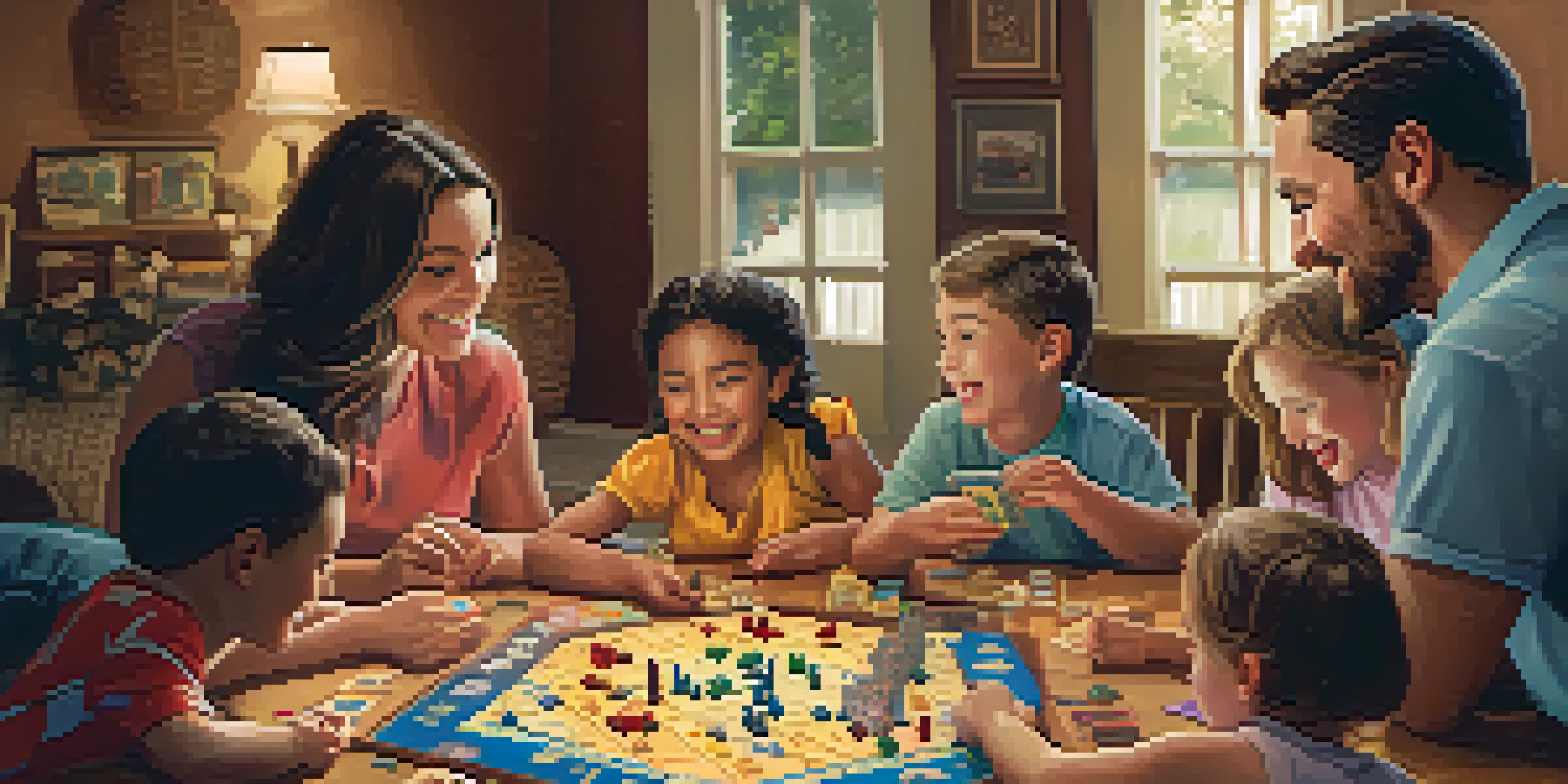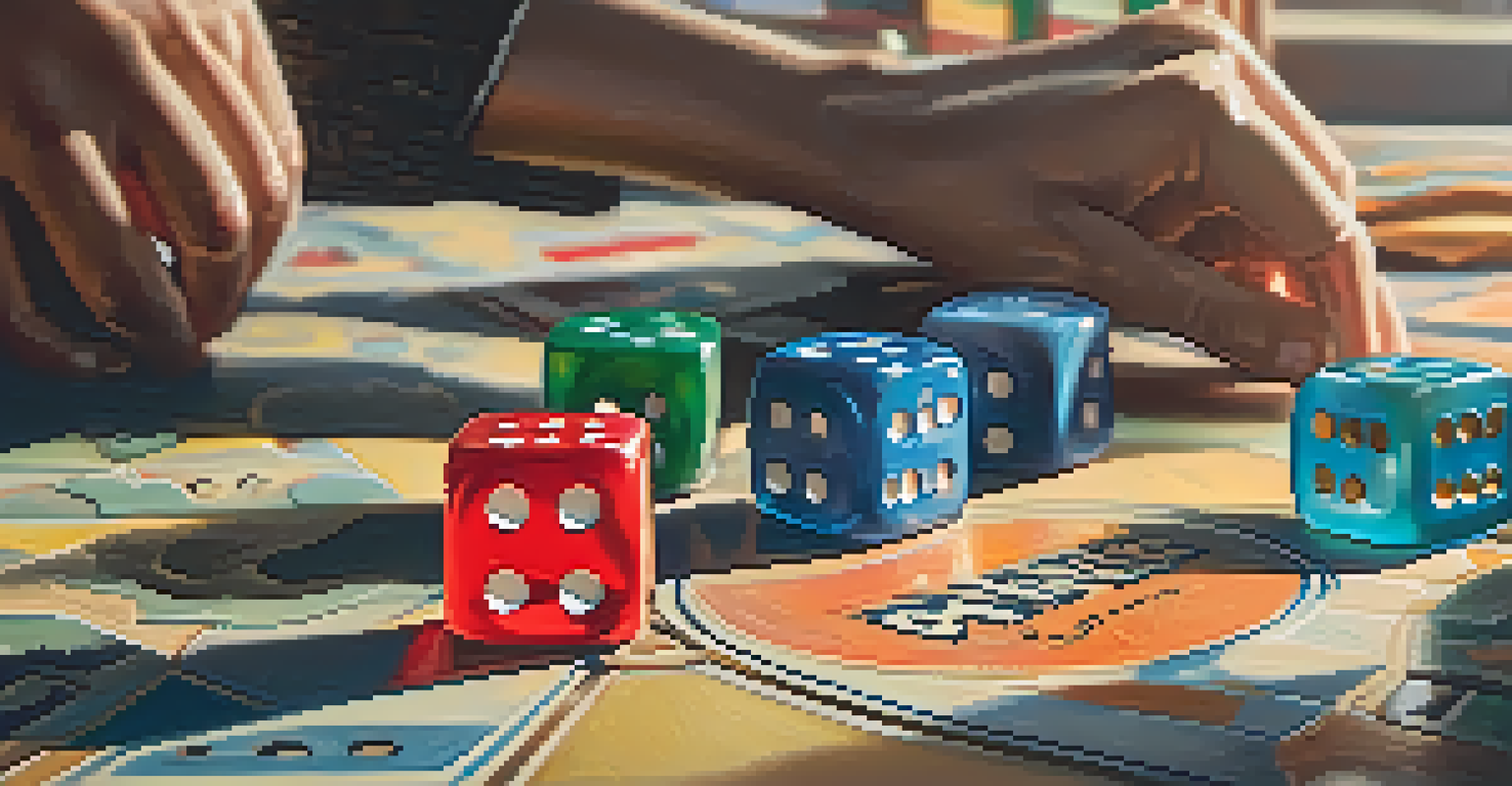The Role of Chance in Board Games: A Closer Look

Understanding Chance: The Basics in Board Games
Chance is a fundamental aspect of many board games, influencing outcomes in unpredictable ways. It often comes into play through dice rolls, card draws, or random events, adding an element of surprise. This unpredictability keeps players on their toes and can lead to unexpected victories or defeats, making each game unique.
In every game, chance plays a role, and it’s how you respond to that chance that defines your strategy.
For instance, consider a game like Monopoly, where rolling the dice determines your movement around the board. The chance element here can drastically affect your strategy, as landing on a property can either be a boon or a bust, depending on your luck. This randomness helps level the playing field, allowing players of varying skill levels to compete.
Ultimately, chance introduces a layer of excitement and suspense, transforming a simple game into an engaging experience. It forces players to adapt their strategies in real-time, making every session memorable and different from the last.
The Balance of Skill and Luck in Gameplay
One of the most intriguing discussions around board games is the balance between skill and luck. While some games rely heavily on chance, others require strategic thinking to outmaneuver opponents. This balance adds depth to gameplay, as players must navigate both the unpredictable and the tactical.

Take chess, for example; it’s purely a game of skill with no element of chance involved. In contrast, games like Sorry! or Candy Land are almost entirely driven by luck. The beauty lies in how different games can cater to players who may prefer one style over the other, offering diverse experiences.
Chance Adds Excitement to Games
The unpredictability of chance keeps players engaged and makes each board game session unique.
Finding the right mix of luck and skill can enhance player engagement. Games that strike this balance often result in thrilling competitions where a lucky break can turn the tide, reinforcing the idea that both elements are vital for a well-rounded gaming experience.
Chance: A Catalyst for Social Interaction
Chance in board games isn't just about winning or losing; it's also a catalyst for social interaction. The shared experience of luck can create bonding moments among players, as they celebrate lucky rolls or commiserate over bad draws. This social dimension is one of the reasons board games have remained popular for generations.
Luck is what happens when preparation meets opportunity.
Imagine a family gathering where the dice rolls determine who moves ahead or who falls behind. Laughter, cheers, and groans fill the room as everyone reacts to the whims of fate. These moments forge connections, making the game memorable on multiple levels, not just the competitive aspect.
Furthermore, these interactions can lead to deeper discussions about strategy and chance, allowing players to share their thoughts and experiences. In a world increasingly dominated by digital interactions, this face-to-face engagement is a refreshing reminder of the joy of human connection.
Games with High Chance: The Appeal of Unpredictability
Games that feature high levels of chance can be particularly appealing to casual gamers. The unpredictable nature of these games often attracts those who may not want to engage in heavy strategy but still enjoy the thrill of competition. Games like Jenga or Twister rely on chance, drawing players in with their easy-to-understand mechanics.
The excitement of not knowing what will happen next keeps players engaged and often results in spontaneous fun. This unpredictability can also level the playing field, allowing players of all skill levels to enjoy the same experience without feeling overwhelmed by complex strategies.
Balancing Skill and Luck is Key
A well-rounded gaming experience requires a thoughtful mix of skill and luck to cater to diverse player preferences.
Additionally, high-chance games are often quicker to play and can lead to a lively atmosphere. Their accessibility makes them ideal for parties or casual get-togethers, where the goal is more about enjoyment than serious competition.
Strategic Games: How Chance Influences Decisions
In games where strategy is paramount, chance still plays a crucial role in influencing player decisions. Even in highly strategic games like Settlers of Catan, the roll of the dice can dictate resource availability, impacting players' plans and strategies. This dynamic interplay between chance and skill adds layers of complexity to the gameplay.
Players must constantly evaluate their options based on the randomness of the game. A player may have a brilliant strategy in mind, but a bad dice roll could derail those plans entirely. This uncertainty forces players to think on their feet and adapt, enhancing the overall challenge.
Moreover, the element of chance can lead to moments of tension and excitement, as players hold their breath waiting for that crucial roll. This blend of strategy and luck keeps participants invested in the game, making for a thrilling experience that can change in an instant.
Designing Games: Integrating Chance Thoughtfully
For game designers, integrating chance thoughtfully is key to creating engaging experiences. The goal is to find the right balance that ensures players feel both challenged and entertained. A well-designed game will utilize chance to create excitement without making the outcome feel entirely random.
Consider the classic game of Clue, where chance determines which cards are drawn, but players must use deductive reasoning to solve the mystery. The interplay between luck and logic keeps players engaged, as they must navigate both elements to succeed.
Chance Fosters Social Connections
The shared experience of luck in board games creates memorable bonding moments among players.
Thus, designers must carefully consider how chance impacts gameplay dynamics. A game that relies too heavily on luck might frustrate strategic players, while one that minimizes chance could alienate those looking for a fun, casual experience. Striking that balance is essential for a game’s lasting appeal.
The Future of Chance in Board Games
As board games continue to evolve, the role of chance is likely to adapt as well. With the rise of hybrid games that blend digital and physical elements, the integration of chance may become even more sophisticated. This opens the door for innovative mechanics that enhance unpredictability while maintaining strategic depth.
Consider games that use apps for random events or unique gameplay scenarios. These modern adaptations can introduce new layers of chance that were previously unattainable in traditional board games. This evolution not only keeps the medium fresh but also attracts a new generation of gamers.

Ultimately, the future of board games will likely see chance remaining a significant element. Whether through traditional methods or innovative mechanics, the unpredictable nature of chance will continue to shape how we play, connect, and engage with one another in this timeless pastime.